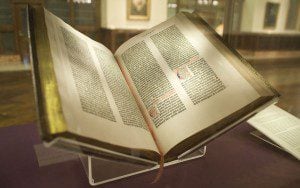 Remember when Vanderbilt University capriciously decided to enforce a “non-discrimination” policy for student groups? This meant practically that religious groups, especially Christian groups, essentially could not select leaders who held to biblical sexual ethics. Sadly, my own alma mater, Bowdoin College of Maine, is doing something very similar at present.
Remember when Vanderbilt University capriciously decided to enforce a “non-discrimination” policy for student groups? This meant practically that religious groups, especially Christian groups, essentially could not select leaders who held to biblical sexual ethics. Sadly, my own alma mater, Bowdoin College of Maine, is doing something very similar at present.
Bowdoin views Bowdoin Christian Fellowship (picture of involved students in upper left), an Inter-Varsity-related group, as being discriminatory for selecting leaders that hold to biblical sexual ethics. I just wrote on this in an essay for the American Spectator:
In a move that has reminded many onlookers of heavy-handed institutional actions at Vanderbilt University and Tufts University, the school’s administration presented Bowdoin Christian Fellowship (BCF) volunteer leaders Rob and Sim Gregory with a “non-discrimination” statement. This statement required, among other things, that the Gregorys open BCF leadership up to students of any sexual orientation.
As reported in the Bowdoin Orient, Dean of Students Tim Foster explained that “If someone’s participating in an organization and they are LGBTIQA and they are not allowed to participate in that organization because of their sexual orientation or they cannot lead that organization because of their sexual orientation, then that’s discrimination.” Foster sharpened the point: “And that is a violation of Maine law and therefore also a violation of College law.” But that was not all, per the Orient. The college needed to know more about the people who were influencing its students: “According to Foster, the initiative grew partially as a reaction to the Penn State scandal in 2011 in which assistant football coach Jerry Sandusky was convicted of multiple counts of child molestation.”
Read the whole piece, which includes my response to Foster.
This shocking development stings me both ideologically and personally. I was a member of BCF for all four of my years at Bowdoin. I was a member of the Leadership Team in my upper-class years, and an emcee of our large-group meetings for two years. Led by Inter-Varsity staff worker Will Truesdell, a godly and kind man, BCF was a crucial and vital part of my Bowdoin experience.
BCF was not large then or now, but it has been one of the college’s most active groups. Currently, Rob Gregory (a lawyer who leads BCF) and his wife Sim invest countless hours in the students who show interest in its offerings. The Gregorys, like so many good-hearted IVCF workers, regularly counsel undergraduates, invite them to their home, help them out financially as they have need, and generally pour into them in sacrificial, generous, and theologically vibrant ways. Gregory revived chapel services at Bowdoin for the first time in decades (the ones that Nathaniel Hawthorne and Henry Wadsworth Longfellow used to skip back in their student days back in the 1820s!), ensuring that the gospel would be preached not only in small-group settings, but in the beautiful Bowdoin chapel. Much ministry in New England is smaller and quieter than in other areas, but the Gregorys have led numerous students to Christ and have maintained a theologically excellent program at the school.
In sum, I hold Rob Gregory in the highest regard. It is not easy to be a busy lawyer with a thriving practice and to lead student ministry, but he and Sim have done the work faithfully and well. They do so without compensation. Like many IVCF workers (most raise their own support and live on little), they work on campus because they genuinely love students, not because they’re getting wealthy or famous.
I am grieved not only because I love and support BCF and the Gregorys, but because I love Bowdoin. As I make clear in my essay, Bowdoin gave me a marvelous education. It was a thoroughly challenging school. It featured outstanding faculty who cared about their students. Every professor I had personally graded every paper I wrote (I have the bleeding-red-ink papers to prove it). Bowdoin offered me the kind of idyllic yet relentlessly self-improving education that one aspires to as a wide-eyed high-school student. Part of the appeal is its tradition. Founded by evangelical Congregationalists in the late-eighteenth century, it is the school of Hawthorne, Longfellow, Franklin Pierce, Joshua Lawrence Chamberlain, Robert Peary and Donald MacMillan, Taylor Mali, Geoffrey Canada, DJ Spooky, George Mitchell, and Reed Hastings. Harriet Beecher Stowe wrote Uncle Tom’s Cabin, the book that Abraham Lincoln said “started the Civil War,” while her husband taught at Bowdoin. I love the history of this small but influential college in Maine.
I encourage readers of the essay and this blog to help me spread the word about Bowdoin’s strong-armed action against Bowdoin Christian Fellowship. The group has not discriminated against students of any kinds. It invites all comers to its Bible studies, chapel services, and events. When it comes to selecting leaders, it is no more discriminatory than any other student group. The Bowdoin Queer Straight Alliance selects leaders in keeping with its beliefs. So does BCF.
It is my earnest hope that Bowdoin will reverse its course of action against Gregory and BCF. Bowdoin is not known for this kind of heavy-handed–but eminently reversible–decision. I know President Barry Mills and Dean of Students Tim Foster, and respect and appreciate them as fair-minded men. It is surprising to see the school they lead taking this course, for Bowdoin has historically achieved an unusual but enviable climate of intellectual exchange.
It distresses me and many other alumni to see the school I love targeting the group I served.











